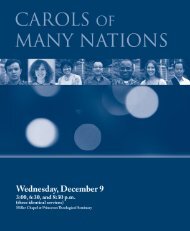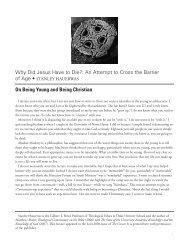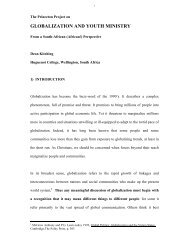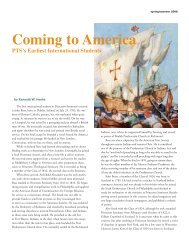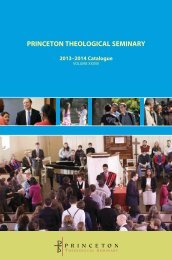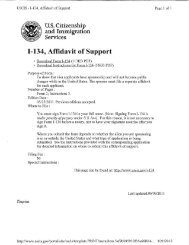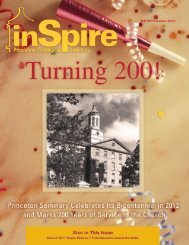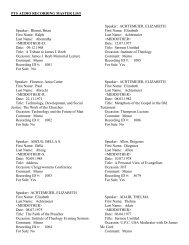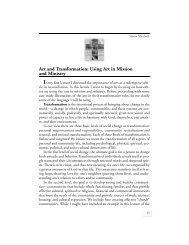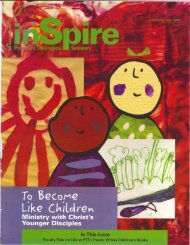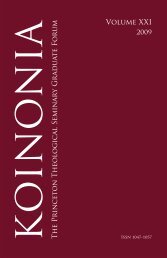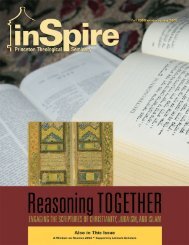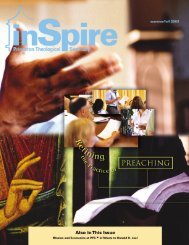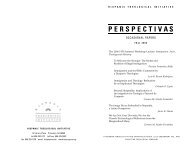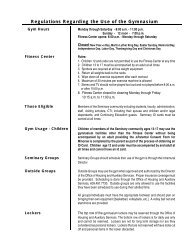PTS Catalogue - Princeton Theological Seminary
PTS Catalogue - Princeton Theological Seminary
PTS Catalogue - Princeton Theological Seminary
You also want an ePaper? Increase the reach of your titles
YUMPU automatically turns print PDFs into web optimized ePapers that Google loves.
Comprehensive Examinations<br />
During their first two years of residence, candidates choose three historical eras<br />
of specialization from among the five (early, medieval, Reformation, modern<br />
European, modern American), and communicate this to their residence committees.<br />
There will be a total of four written exams, one of which may be submitted as<br />
a research paper. Any one of these exams will combine the era with another field<br />
of study of the department (e.g. ecumenics, history of religions, missiology, sociology<br />
of religion). After the written exams are completed, there will be a comprehensive<br />
oral examination based on all four of them.<br />
The four exams will be based on the chosen eras and include the following:<br />
1. One specialized exam in the areas defined as requisite background<br />
for the proposed dissertation. This typically falls within one of the<br />
three chosen eras. (If a candidate’s dissertation topic involves more<br />
than one era, adjustments to the exam structure may be made by the<br />
residence committee.)<br />
2/3. Two examinations, each based on one of the remaining eras of choice<br />
4. One comparative examination focused on a topic that involves at least<br />
two different historical divisions and/or cultural contexts<br />
All examiners are appointed by the department in consultation with the student<br />
and his or her residence committee. Bibliographies for the examinations are<br />
compiled by the student in consultation with the examiner.<br />
Interdisciplinary exams involve one examiner for each discipline. In all cases, the<br />
instructors setting the examination have final responsibility for determining the<br />
bibliography.<br />
2. Mission, Ecumenics, and the History of Religions (MEHR)<br />
MEHR integrates the fields of Mission (history and theology), Ecumenics (history<br />
and theology), and History of Religions to promote the interdisciplinary study of<br />
Christianity as a cross-cultural, global phenomenon. Capitalizing on the <strong>Seminary</strong>’s<br />
diverse resources, MEHR nurtures a broad perspective on Christianity’s historical<br />
and contemporary expansion and expression throughout the world, including<br />
representative theologies emanating both from the global South and the global<br />
North. Additionally, MEHR pays special attention to the ecumenical interrelations<br />
of the global Christian communion as well as to its interactions with believers from<br />
other faith communities. As a whole, MEHR provides a rigorous scholarly foundation<br />
for a multifaceted study of world Christianity.<br />
Residence Requirements<br />
Students are expected to complete eight seminars during two years of residence.<br />
These seminars will include at least one from each of the three major fields in the<br />
program: Mission, Ecumenics, and History of Religions. The remaining seminars may<br />
draw on courses in the M.Div. program (with enhanced requirements) that have a<br />
bearing on the student’s area of concentration. The program may be rounded out by<br />
doctoral seminars offered elsewhere in the <strong>Seminary</strong> or at the University. The resulting<br />
program will be tailored individually by the candidate in consultation with her<br />
or his residence committee. The candidate is expected to participate in the monthly<br />
!# 66#"<br />
cat1213



